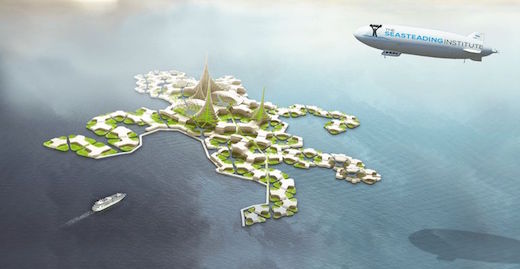
The Seasteading Institute along with several investors, are proposing the building of a floating city-state, which could serve a variety of purposes. For one, it could be used as a real life environment for trying out new models of government, as well as serve a host of other functions when it comes to preserving and bettering the world we live in.
According to the Seasteading Institute, the creation of floating cities is the first step in fulfilling their “8 Great Moral Imperatives,” namely feeding the hungry, enriching the poor, curing the sick, cleaning the atmosphere, restoring the oceans, living in balance with nature, powering civilization sustainably and putting an end to war.
It is the belief of the Institute that to fulfill these goals, we must make use of the oceans in new ways. Oceans provide a lot of potential for accommodating the growing global population, as well as offering a source of food, and generating sustainable energy.

A floating city-state like the one proposed by the Seasteading Institute would offer all of the above, with the added bonus of finding new ways of government, which do not lead to such inequalities as the current systems do. In a way, floating cities would also be independent of current governments and would be able to separate themselves from a country simply by floating the city to a new location. While this seems like a utopic idea, there would doubtlessly be a lot of legal and other problems associated with it.
Deltasync has already created an initial design for this floating city. It would comprise a series of modular platforms, which could be slotted together. The platforms would either take the form of 164 x 164 ft (50 x 50 m) reinforced concrete squares, or pentagons with 164 ft (50 m) sides. A platform created out of these would be able to support three-story buildings.
The designers factored in apartment buildings, terraced housing, office space and hotels, so such a city-state would really deserve the name. The initial concept proposes 11 modules, which could house 225-300 full-time residents and would cost an estimated $167 million to build. The platforms could also be reassembled at need, by shifting the platforms around.


The Seasteading Institute is certain that a market for this type of city-state does exist, and they are currently in the process of developing it further to achieve a price suitable for the market. They are also looking for a nation willing to host it in its waters and offer it relative autonomy and political independence.
Related Articles on JetsonGreen.com:
Freedom Cove is a Gorgeous Self-Sufficient Floating Home
Micro Homes That Can Be Build Between Buildings
Underwater Floating House

Leave a Reply
You must be logged in to post a comment.